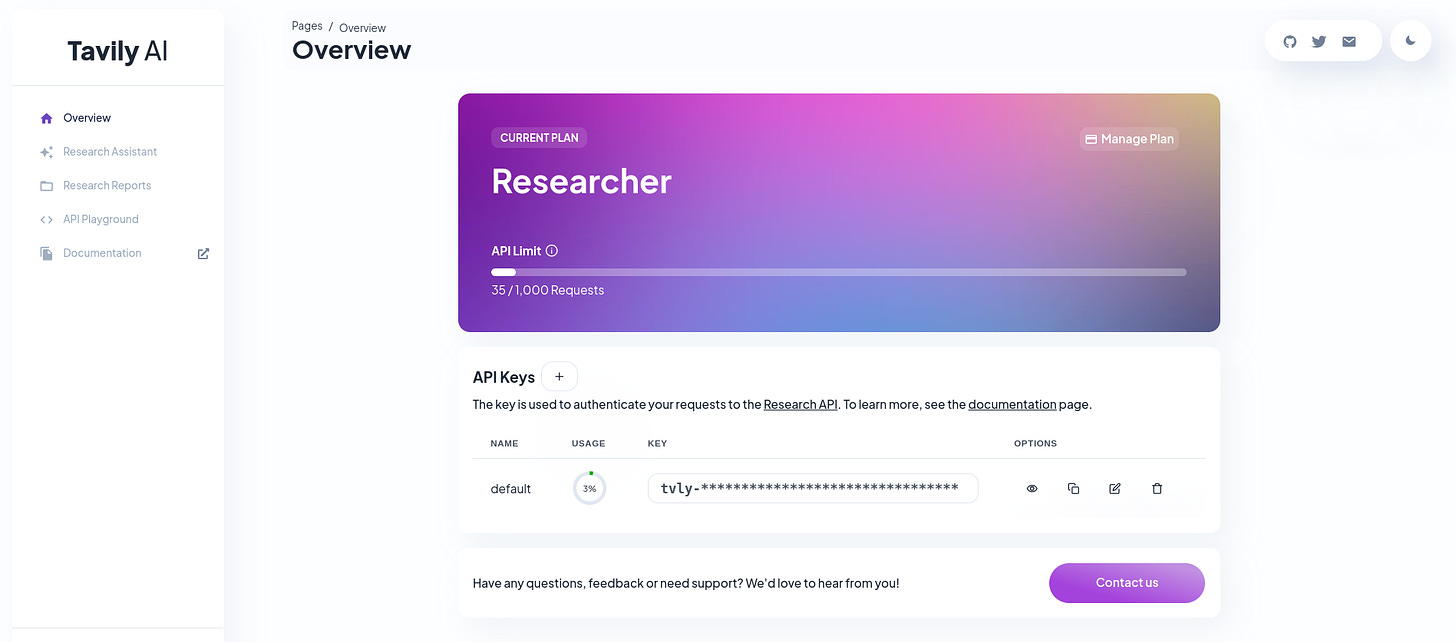Introduction
LLMs and RAG systems have shown to be advantageous over time. They not only provide engaging discussions that deliver helpful information, but they also open up new avenues for tailored and intelligent applications, transforming areas ranging from customer service to scientific research. Despite their unique and powerful skills, there is evidence that they can produce plausible-sounding but inaccurate information, particularly when confronted with unclear questions or a lack of relevant data. Furthermore, they have demonstrated a lack of knowledge updates, causing them to occasionally present "old" information.
To mitigate those issues, the ability to connect to reliable and up-to-date resources is essential. Using an additional tool to retrieve external knowledge can help RAG and LLMs access up-to-date information, mitigating hallucinations and enhancing factual accuracy.
The Tavily Search API is suitable for that job. It is a search engine designed specifically for LLMs and RAG, with the goal of providing efficient, rapid, and permanent search results. Tavily specializes in improving search results for AI developers and autonomous AI agents. Furthermore, Tavily uses private financial, coding, news, and other internal data sources to supplement web content. As a result, Tavily empowers developers to build more accurate, insightful, and contextually aware AI applications.
In this article, we will talk about the Tavily Search API, diving into its functionalities and how it leverages AI for enhanced search. The structure of this writing is as follows:
Understanding the Power of Tavily Search API: A quick overview of the Tavily Search API, including why it is important and how it works.
Code in Action: Start with a basic code example showcasing a simple search query using Tavily.
Conclusion.
Understanding the Power of Tavily Search API
Tavily Search API is a specialized search engine designed to supercharge AI applications. Unlike traditional search engines, Tavily is optimized for Large Language Models (LLMs) and Retrieval Augmented Generation (RAG) tasks. It delivers efficient, quick, and persistent search results, focusing on providing the most relevant information for AI developers and autonomous agents.
Tavily is a search engine built from the ground up for AI models. Tavily’s developers understand the unique challenges faced by LLMs and RAG systems, and they've designed Tavily to be the ultimate solution. With a focus on speed, accuracy, and relevance, Tavily delivers search results tailored to AI applications. The platform handles the heavy lifting of data collection, filtering, and extraction, empowering us to build exceptional AI models.
Current search APIs like Google, Serp, and Bing provide irrelevant results, requiring developers to scrape sites, filter irrelevant information, and optimize content for LLM context limits, a task that requires skills. The Tavily Search API takes a smarter approach. It does the heavy lifting for us by:
Sifting Through the Noise: Tavily searches across 20+ sites in one go, then uses intelligent AI to pinpoint the most relevant information for our specific task or query.
Giving Control: We can fine-tune our searches with custom fields like context and token limits, ensuring your AI gets the perfect data it needs.
Making Your AI Smarter: Tavily even helps our AI make better decisions by suggesting follow-up searches and providing concise answers for better communication between agents.
Code in Action
We will program our experiment in Python, therefore, we need to install the Tavily’s Python SDK via command line pip install tavily-python. The package simplifies interaction with the Tavily API, allowing us to use all of their search features straight from our Python scripts.
To access the tool, we visit Tavily’s dashboard and get API key.
The Tavily provides 3 simple ways of searching:
search: performs a Tavily Search query and returns the response as a well-structureddict.get_search_context:performs a Tavily Search query and returns astrof content and sources within the provided token limit. It's useful for getting only related content from retrieved websites without having to deal with context extraction and token management.qna_search: performs a search and returns a string containing an answer to the original query. This is optimal to be used as a tool for AI agents.
Together, the code implementation will be
import os
from dotenv import load_dotenv
from tavily import TavilyClient
load_dotenv()
TAVILY_API_KEY = os.getenv("TAVILY_API_KEY")
# Step 1. Instantiating your TavilyClient
tavily_client = TavilyClient(api_key=TAVILY_API_KEY)
# Step 2.1. Executing a simple search query
response = tavily_client.search("Who is Leo Messi?")
# Step 2.2. Executing a context search query
# answer = tavily_client.get_search_context(query="Who is Leo Messi?")
# Step 2.3. Executing a Q&A search query
# answer = tavily_client.qna_search(query="Who is Leo Messi?")
# Step 3. Get the result!!!
print(result)Conclusion
In our exploration of the Tavily Search API, we’ve delved into its functionalities, demystifying how it harnesses AI to enhance search. The Tavily Search API emerges as a vital tool for developers seeking to build more robust and reliable LLMs and RAG systems. By providing accurate, contextually relevant information, Tavily helps mitigate the challenges of hallucinations and outdated knowledge, paving the way for more trustworthy and insightful AI applications.
As AI continues to evolve and permeate various aspects of our lives, the need for reliable and efficient search capabilities will only increase. Tavily plays a crucial role in this evolution, allowing developers to create AI applications that are both intelligent and trustworthy. With its focus on accuracy, speed, and adaptability, Tavily Search API is a game-changer for the future of AI-powered search and information retrieval.
Reference
Gao et al. - Retrieval-Augmented Generation for Large Language Models: A Survey - URL: https://arxiv.org/pdf/2312.10997v5
IBM - What is retrieval-augmented generation? - URL: https://research.ibm.com/blog/retrieval-augmented-generation-RAG
Chen et al. - On the Effectiveness of Large Language Models in Domain-Specific Code Generation - URL: https://arxiv.org/pdf/2312.01639v2
Tavily Docs - Getting started - URL: https://docs.tavily.com/docs/tavily-api/introduction






